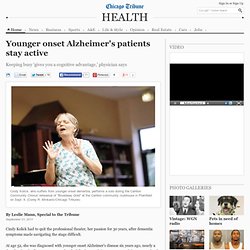

Diagnosis, Treatments & Prevention. Organisations, Forums & Information sites. Younger onset Alzheimer's diagnosis doesn't rule out active life. Cindy Kolick had to quit the professional theater, her passion for 30 years, after dementia symptoms made navigating the stage difficult.

At age 52, she was diagnosed with younger onset Alzheimer's disease six years ago, nearly a decade after the first symptoms surfaced while she was doing summer stock in New England. "I was doing the play 'Corpse' … I went to make my entrance and nothing looked familiar," recalled Kolick. But despite the devastating diagnosis, she remains active singing in the chorus at her Plainfield residential development for older adults, where she and her husband now live. Her whirlwind daily schedule –– singing, exercising, researching Alzheimer's online and participating in drug studies –– is a testament to the changing face of the disease, especially among those diagnosed before age 65.
Early diagnosis of Alzheimer's disease has health, financial and social benefits. The World Alzheimer's Report 2011 'The Benefits of Early Diagnosis and Intervention', released September 13 by Alzheimer's Disease International (ADI), shows that there are interventions that are effective in the early stages of Alzheimer's disease, some of which may be more effective when started earlier, and that there is a strong economic argument in favour of earlier diagnosis and timely intervention. ADI commissioned a team of researchers led by Professor Martin Prince from King's College London Institute of Psychiatry, to undertake the first-ever, comprehensive, systematic review of all evidence on early diagnosis and early intervention for dementia.
Currently, the majority of people with dementia receive a diagnosis late in the course of the disease, if at all, resulting in a substantial 'treatment gap'. Lead author Prof Prince said: 'There is no single way to close the treatment gap worldwide. World Alzheimer Report 2011. The World Alzheimer Report 2011 shows that there are interventions that are effective in the early stages of dementia, some of which may be more effective when started earlier, and that there is a strong economic argument in favour of earlier diagnosis and timely intervention. Key findings To prepare the report, ADI commissioned researchers Prof Martin Prince, Dr Renata Bryce and Dr Cleusa Ferri at the Institute of Psychiatry, King's College London, to undertake the first-ever, comprehensive, systematic review of all of the evidence on early diagnosis and early intervention for dementia.